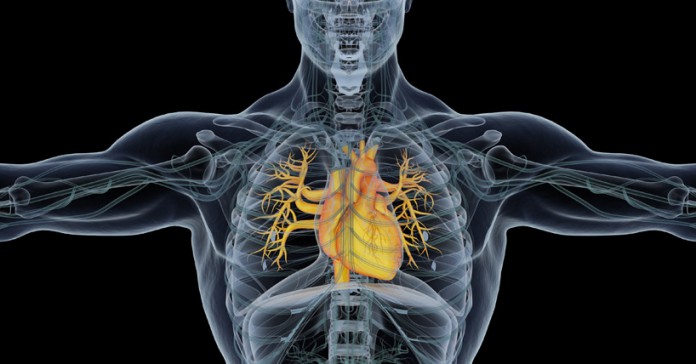Research reveals that treatment of heart attack patients for a common condition, underactive thyroid, with levothyroxine does not improve heart muscle function, so is unlikely to
New Delhi, July 30, 2020; The results of a double-blind randomised clinical trial which was carried out in six UK hospitals and led by experts at Newcastle University, UK are published today in JAMA.

Important Announcement – EasyShiksha has now started Online Internship Program “Ab India Sikhega Ghar Se”

Mild or subclinical hypothyroidism is a condition in which the body doesn’t produce enough thyroid hormones and is very common affecting approximately 10% of the adult population. Management of the condition is currently haphazard due to the lack of high quality evidence either for or against treatment. Some clinicians may treat whereas others may not – and this is particularly the case in high risk conditions such as heart attacks.
Important Announcement – EasyShiksha has now started Online Internship Program “Ab India Sikhega Ghar Se” during this lockdown.
Observational studies have previously suggested that patients with cardiac problems, including heart attacks, and subclinical hypothyroidism are at higher risk of death. And so, current guidelines suggest that these patients should be treated with levothyroxine.
This clinical trial demonstrates that treatment with levothyroxine does not improve cardiac function in patients who have had a heart attack and therefore is unlikely to be beneficial.
Dr Salman Razvi, Senior Lecturer and Consultant Endocrinologist, Newcastle University and the Queen Elizabeth Hospital in Gateshead, explains: “The results of this trial will help clinicians reconsider offering treatment with levothyroxine to tens of thousands of patients with subclinical hypothyroidism worldwide. The results of this trial demonstrate that there are no significant improvements for patients with heart attacks who are given levothyroxine.
“On this basis, screening for and subsequent treatment of subclinical hypothyroidism in patients who have had a heart attack to preserve or improve heart function is not justified.”
Top Courses in Software Engineering
The clinical trial
In the trial, 95 patients were recruited with 46 receiving levothyroxine and 49 a placebo. After 12 months, heart function improved in both groups – but there was no greater improvement in those receiving levothyroxine.
Limitations of the trial include the low dose offered initially which may have reduced the therapeutic effect and there may be a more significant improvement in patients were patients to start treatment sooner (average 17 days after heart attack). In addition, 4 in 10 patients with subclinical hypothyroidism on the initial blood test had normalised their levels when rechecked a few days later.
Empower your team. Lead the industry
Get a subscription to a library of online courses and digital learning tools for your organization with EasyShiksha
Request NowQ. Are EasyShiksha's internships truly free?
Yes, all internships offered by EasyShiksha are completely free of charge.
Q. How can I apply for an internship with EasyShiksha?
You can apply by visiting our website, browsing available internships, and following the application instructions provided.
Q. What types of internships are available through EasyShiksha?
EasyShiksha offers a wide range of internships across technology, business, marketing, healthcare, and more. Opportunities are continuously updated.
Q. Will I receive a certificate upon completing an internship?
Yes, upon successful completion, you will receive a certificate recognizing your participation and achievements.
Q. Are EasyShiksha's internship certificates recognized by universities and employers?
Yes, the certificates are recognized by universities, colleges, and employers worldwide.
Q. Is the download of certificates free or paid?
Access to internships and courses is free, but there is a small fee to download certificates, covering administrative costs.
Q. When can I start the course?
You can choose any course and start immediately without delay.
Q. What are the course and session timings?
These are fully online courses. You can learn at any time and pace. We recommend following a routine, but it depends on your schedule.
Q. What will happen when my course is over?
After completion, you will have lifetime access to the course for future reference.
Q. Can I download the notes and study material?
Yes, you can access and download course materials and have lifetime access for future reference.
Q. What software/tools would be needed for the course?
All necessary software/tools will be shared during the training as needed.
Q. I’m unable to make a payment. What should I do?
Try using a different card or account. If the problem persists, email us at info@easyshiksha.com.
Q. Do I get the certificate in hard copy?
No, only a soft copy is provided, which can be downloaded and printed if required.
Q. The payment got deducted but shows “failed”. What to do?
Technical errors may cause this. The deducted amount will be returned to your account in 7-10 working days.
Q. Payment was successful but dashboard shows ‘Buy Now’?
Sometimes payment reflection is delayed. If it takes longer than 30 minutes, email info@easyshiksha.com with the payment screenshot.
Q. What is the refund policy?
If you face technical issues, you can request a refund. No refunds are issued once the certificate has been generated.
Q. Can I enroll in a single course?
Yes, select the course of interest, fill in the details, make payment, and start learning. You will also earn a certificate.
Q. My questions are not listed above. I need further help.
Contact us at info@easyshiksha.com for further assistance.
The team will now be making this research available as part of the evidence to change existing guidelines.
Dr Razvi adds: “To any patient who has had a heart attack and has been diagnosed with subclinical hypothyroidism, I would advise that they consult their GP on whether levothyroxine is likely to be of benefit. The results of our trial suggest that all such patients should have their thyroid function rechecked after a few weeks. Treatment with levothyroxine should not be started routinely in such patients. Furthermore, international guidelines should be amended to reflect this finding.”
For more information related to technology, visit HawksCode and EasyShiksha
ALSO READ: key-policy-effort-provide-safety-net-says-director-institute
Get Course: Software-Testing-Tutorial-Course



































































